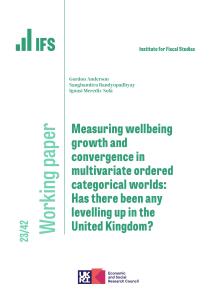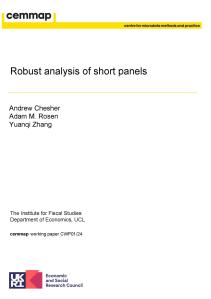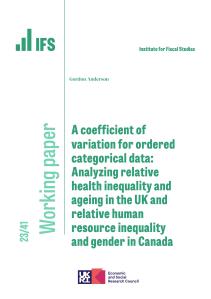Access
Understanding Society, the UK Household Longitudinal Study has a programme of research and development that underpins innovations in data collection methods. One of our current focuses is on using mobile applications to collect additional data that supplement data collected in annual interviews. To date, we have used mobile apps to collect data on consumer expenditure, well-being, anthropometrics and cognition. In this paper, we review the potential barriers to data collection using mobile apps and experimental evidence collected with the Understanding Society Innovation Panel, on what can be done to reduce these barriers.
Authors

Annette Jäckle
Associate Director University of Essex
Research Professor University of Michigan
Journal article details
- DOI
- 10.1111/1475-5890.12351
- Publisher
- Institute for Fiscal Studies
- Issue
- Volume 44, Issue 4, pages 361-376
Suggested citation
J, Burton and M, Couper and A, Jäckle. (2024). 'Understanding Society: minimising selection biases in data collection using mobile apps' Fiscal Studies, Volume 44, Issue 4, 44(4/), pp.361–376.
More from IFS
Understand this issue

Sure Start achieved its aims, then we threw it away
15 April 2024

Why inheritance tax should be reformed
18 January 2024

Social mobility and wealth
12 December 2023
Policy analysis

ABC of SV: Limited Information Likelihood Inference in Stochastic Volatility Jump-Diffusion Models
We develop novel methods for estimation and filtering of continuous-time models with stochastic volatility and jumps using so-called Approximate Bayesian Compu- tation which build likelihoods based on limited information.
12 August 2014

Assessing the economic benefits of education: reconciling microeconomic and macroeconomic approaches
This CAYT report discusses the strengths and limitations of several approaches to assessing the effect of education on productivity.
14 March 2013

Misreported schooling, multiple measures and returns to educational qualifications
We provide a number of contributions of policy, practical and methodological interest to the study of the returns to educational qualifications in the presence of misreporting.
1 February 2012
Academic research

Measuring wellbeing growth and convergence in multivariate ordered categorical worlds: Has there been any levelling up in the United Kingdom?
21 December 2023

Robust analysis of short panels
8 January 2024

A coefficient of variation for ordered categorical data: Analyzing relative health inequality and ageing in the UK and relative human resource inequality and gender in Canada
21 December 2023